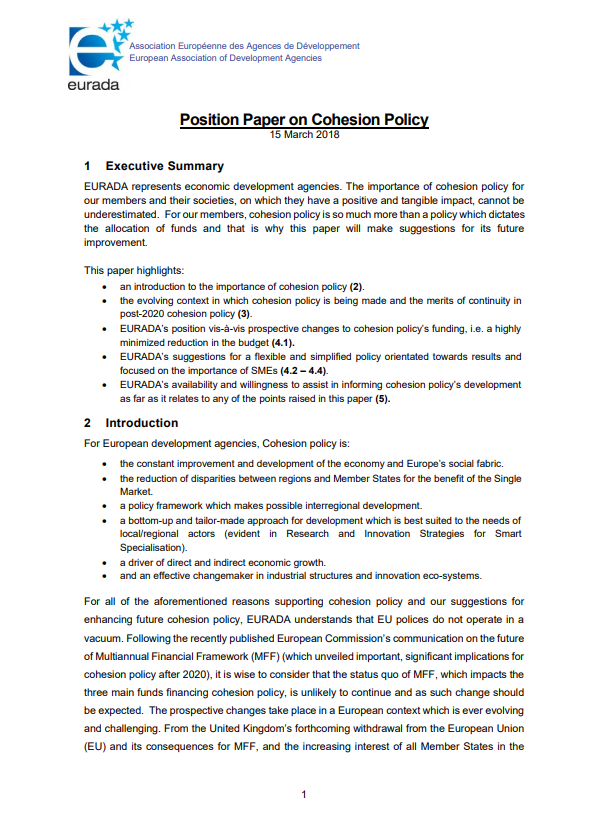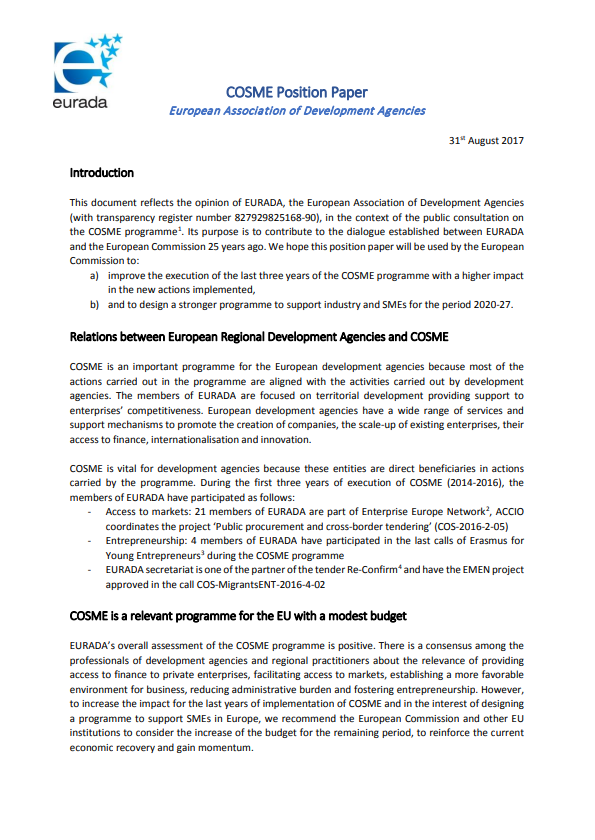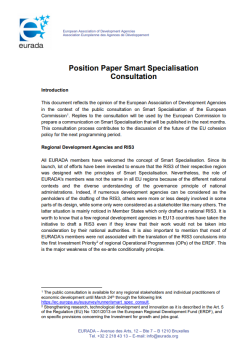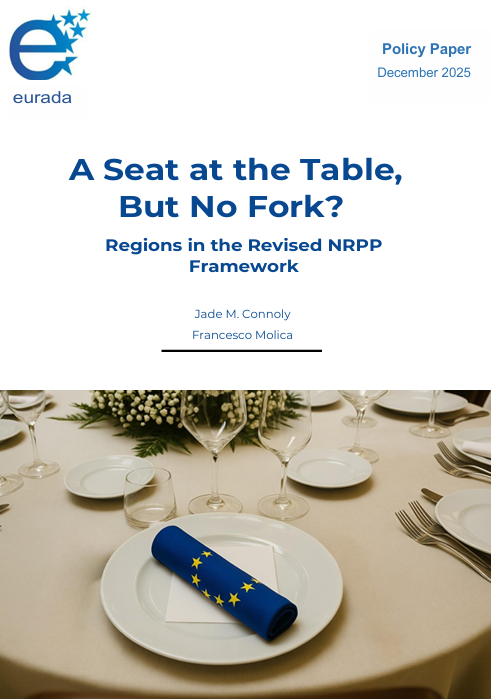
A Seat at the Table, but no Fork? Regions in the Revised NRPP Framework
This policy paper provides a short analysis of the European Commission’s suggested amends to the National and Regional Partnership Plans (NRPPs) proposed regulation, assessing their impact on regional governance, innovation policy, and territorial and thematic allocations. Initially framed as a simplification drive, the NRPPs proposed regulation triggered strong concerns over recentralisation and the weakening of the partnership principle, prompting the Commission to propose amendments in autumn 2025 to strengthen multi-level governance and territorial safeguards. The paper argues that, despite these improvements, the balance of power in the future framework would remain largely national, making the effective role of regions and regional innovation policy contingent on how the new rules are implemented in practice. Moreover, the actual volume of funding allocated to specific territorial and thematic objectives related to cohesion, including interregional cooperation in the field of innovation, remains unclear and might shrink significantly in comparison to the previous period.
Click here to read our policy paper.
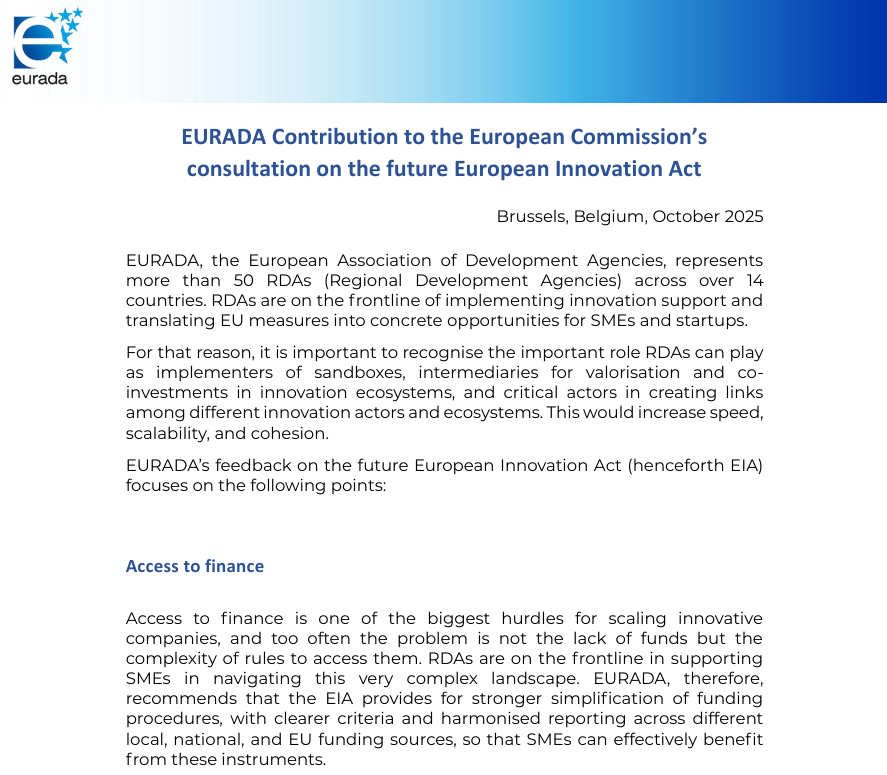
EURADA Contribution to the European Commission’s consultation on the future European Innovation Act
EURADA, representing over 50 Regional Development Agencies (RDAs) across 14+ countries, highlights the essential role of RDAs in implementing innovation policies and turning EU measures into real opportunities for SMEs and startups. In its feedback on the forthcoming European Innovation Act (EIA), EURADA stresses the need to simplify access to finance, strengthen public procurement as a driver of innovation, and unlock regional research and innovation potential through stronger brokerage mechanisms and smarter use of regional strengths.
EURADA also calls for place-based talent initiatives to attract and retain innovators beyond capital cities, and for regulatory frameworks that work effectively at regional level. The EIA should empower RDAs as key actors in local ecosystems—implementing sandboxes, facilitating co-investments, and connecting innovation networks. By embracing regional diversity, the EIA can spread innovation capacity more evenly and turn Europe’s territorial variety into a genuine competitive advantage.
Click here to read the EURADA contribution to the European Commission’s consultation on the future European Innovation Act.

From Partnership to Parentship? Regions in the 2028–2034 EU Budget
Europe’s next long-term budget promises to be “simpler, faster, stronger.” For regional authorities, it may also be tighter, taller, and further away. The Commission’s 2028–2034 MFF proposal welds cohesion, agriculture and more into one “mega fund”, couples Horizon’s collaborative research with a turbocharged Competitiveness Fund, and hardwires lump sums and performance metrics across the board. EURADA welcomes the renewed firepower for innovation and industrial capacity—but warns that the scaffolding looks worryingly top-down. This short paper dissects what that shift means for regions and cities: where governance levers move, where selection criteria bite, and where regional voices risk going mute. It closes with practical asks to keep subsidiarity alive—not as a slogan, but as an operating system for Europe’s competitiveness
Click here to read the EURADA Position Paper on the recently released Multiannual Financial Framework (MFF) 2028 - 2034.
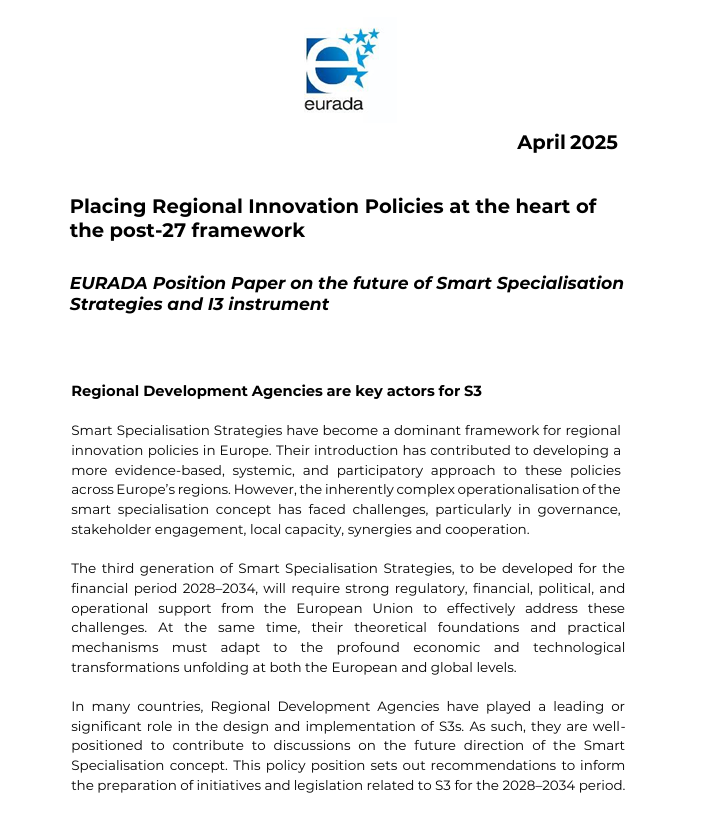
EURADA Position Paper on the future of Smart Specialisation Strategies and I3 instrument
Smart Specialisation Strategies (S3) have become a cornerstone of regional innovation policy across Europe. As we look toward the 2028–2034 programming period, EURADA calls for a stronger, more flexible, and better-supported S3 framework to ensure it remains fit for purpose in a rapidly changing global and technological landscape.
This position paper outlines key recommendations to enhance S3 governance, promote better synergies across funding instruments, and reinforce the role of Regional Development Agencies in shaping innovation policies. It also advocates for the continued and expanded role of the Interregional Innovation Investments (I3) instrument as a crucial tool for scaling regional innovations and strengthening European value chains.
With targeted improvements and sustained EU-level support, S3 can remain a central tool in Europe’s industrial and innovation strategy—driving competitiveness, resilience, and place-based economic transformation.
Click here to read the EURADA Position Paper on the future of Smart Specialisation Strategies and I3 instrument.
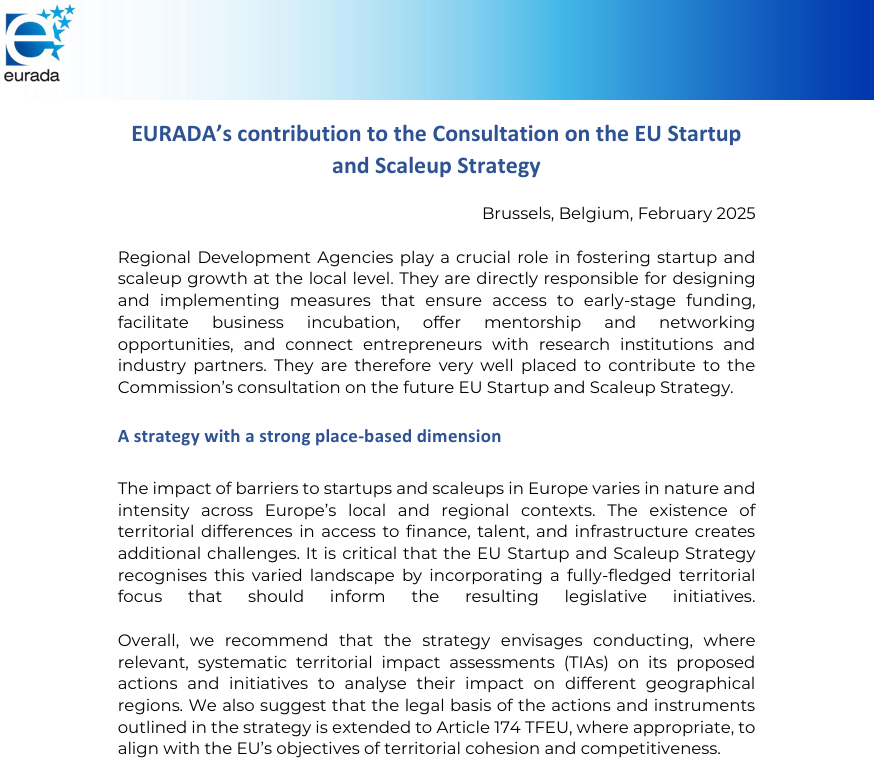
EURADA’s contribution to the Consultation on the EU Startup and Scaleup Strategy
In light of the EU competitiveness compass and the announcement of the development of a new EU Startup and Scaleup strategy, the Board of Directors discussed, contributed to drafting and approved, on 12 March 2025, EURADA’s contribution to the consultation on the EU Startup and Scaleup Strategy.
In the contribution submitted to the European Commission, EURADA highlights the crucial role that Regional Development Agencies play in fostering startup and scaleup growth at the local level. Key points include:
- Adopting a strong place-based dimension: The diverging barriers encountered by startups and scaleups (difficulty accessing finance, talent, infrastructure) will be heavily influenced by regional and local contexts. The EU startup and scaleup strategy should take into account these specificities and adopt a territorial focus.
- Aligning the strategy with EU place-based policies and instruments: Measures to support startup growth are implemented within specific geographical contexts and are often designed and implemented by local and regional actors. The strategy should be aligned with other EU, national and regional initiatives on place-based innovation.
- Avoiding a purely financial-driven approach: In order to foster European Innovation, financial indicators should not be the sole indicators taken into account to unlock financial support for startups and scaleups. Other market and impact indicators should be considered.
- Addressing long-term innovation funding gaps: through the creation of a structured financial instrument that allows public finance institutions to support startups and scaleups.
- Strengthening Europe's economic autonomy through innovation: EU innovation plans should be backed by a startup and scaleup ecosystem that empowers Regional Development Agencies to finance high-potential startups.
- Tackling regulatory fragmentation: Regulatory fragmentation hampers startup growth in regions with fewer administrative ressources. Regulatory simplification is essential to foster the growth of startups across all regions.
- Enhancing cross-border cooperation: Strengthening cross-border regional cooperation is essential in helping startups scale beyond national markets.
- Strengthening regional talent retention and mobility programs: It is important to facilitate the valorisation of skills and qualifications across EU regions, incentivise skilled professionals to work in emerging regional innovation hubs and facilitate professional mobility.
Click here to read EURADA's contribution to the Consultation on the EU Startup and Scaleup Strategy.
From Specialisation to Transformation? The future of S3s amid uncertain times
EURADA launches its new think tank activities with a discussion paper examining five key dimensions of Smart Specialisation Strategies (S3). Authored by Francesco Molica, the paper reflects on the role of S3 within the evolving EU competitiveness agenda, its ability to leverage diverse funding sources, its connection to the conditionality mechanism, the scope for policy experimentation, and the broadening of its strategic focus.
The EURADA Think Tank serves as a platform for dialogue on regional development and innovation, with the view to fostering insights and debate among policymakers, researchers, and practitioners. This discussion paper series is one of the main strands addressing critical issues in territorial innovation strategies and policy implementation. Another strand involves meetings and events, which will see for instance the organisation of an event on the future of cohesion policy on 17 March.
Download the document as PDF.
Interregional Innovation Investment (I3) Initiative
This document reflects the opinion of EURADA and the members in the context of the public consultation on the Interregional Innovation Investment (I3) Initiative. This instrument seeks to help actors involved in smart specialisation strategies to cluster together, scale up and bring innovation to the European market, with an indicative budget of € 500 million. EURADA and the members welcome the I3 Initiative proposed by the European Commission, remarking that the new instrument should: be oriented to private companies; have structures that integrate all regions, including from non-EU countries; stimulate synergies in ESIF, and perhaps beyond.
Download the document as PDF.
Innovation Ecosystems
The purpose of this document is to present ideas to improve European regional innovation ecosystems. This position paper is a part of the strategic planning consultation process of the European Commission to design a programme aimed at improving innovation ecosystems’ connectiveness within the 3rd Pillar of the Horizon Europe programme. At this stage of the policymaking process, the Horizon Europe programme will likely have a budget of €500 million for the period 2021-2027.
Download the document as PDF.
Cohesion Policy
The importance of cohesion policy for our members and their societies, on which they have a positive and tangible impact, cannot be underestimated. For our members, cohesion policy is much more than a policy which dictates the allocation of funds and this is why this paper will make suggestions for its future improvement.
Download the document as PDF.
COSME
This document reflects the opinion of EURADA in the context of the public consultation on the COSME programme. COSME is the EU programme for the Competitiveness of Enterprises and SMEs, running from 2014 to 2020, with a budget of €2.3billion. EURADA’s overall assessment of the COSME programme is positive. In general, professionals of development agencies agree on the relevance of providing access to finance to private enterprises, facilitating access to markets, establishing a more favorable environment to do business, reducing administrative burden and fostering entrepreneurship.
Download the document as PDF.
Smart Specialisation Consultation
This document reflects the opinion of EURADA in the context of the public consultation on Smart Specialisation (S3) of the European Commission. There is a consensus among economic development practitioners about the suitability of the S3 tool to engage a multiplicity of stakeholders in a common transformation agenda. The process is inclusive, bottom-up and brings new actors to a shared decision process that is relevant for the economic growth of the countries and regions.
Download the document as PDF.


